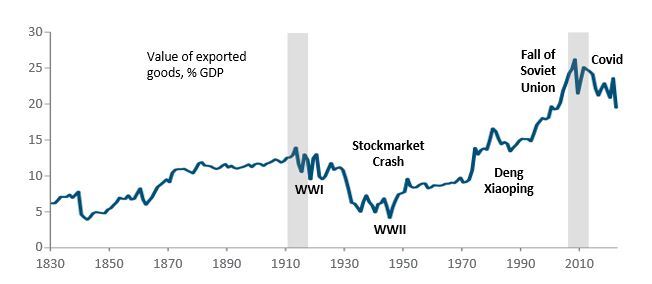Insights

By: Graham Wainer
Halting globalisation is key concern for inflation – Graham Wainer
If globalisation was powerful for disinflation, de-globalisation is the reverse
We have reached peak globalisation, according to Graham Wainer, Chief Investment Officer of Stonehage Fleming. “The world has reached the limits of economic and political integration”, he told guests at the Stonehage Fleming’s Family Investment Conference in London on Tuesday, this week. The result, explained Graham, is the partial reversal of one of the most important deflationary forces at play in global economies. “Treaties such as Maastricht, the North America Free Trade Agreement, or the World Trade Organization Agreements were all put in place to drive globalisation, boosting trade and removing barriers between nations,” he said. “They took trade as a percentage of global GDP from about 5% after WW2 to around 20% in 2022 (see Chart 1). All that has now paused and is partly in reverse.”
Chart 1

Source: Goldman Sachs, Fouquin and Hugot (CEPII 2016), April 2022
This reversal, said Graham, is down to a combination of powerful geopolitical, economic and social factors. Tensions with US trading partners, for instance, prompted former US President, Donald Trump, to impose tariffs on China, Mexico, Canada and the EU, among others, while in the UK we have had Brexit. Furthermore, the global pandemic and outbreak of war in Ukraine have massively impaired supply chains and further shaken investors’, voters’ and governments’ belief in the globalised economic machine. “The Covid crisis laid bare a lack of resilience in all economies around the world. Now, the war in Ukraine has exposed our reliance on energy from bad actors”, said Graham. “All this has driven a reversal in globalisation. Put simply, if you thought that globalisation was a powerful factor for disinflationary trends, de-globalisation has to be working in the reverse.”
While the transitory effects of inflation will go away in time, explained Graham, economies will continue to be subject to the undertow of de-globalisation. “Some structural factors will persist: increasing public debt, unprecedented growth in money supply, underinvestment in global oil resources. And, without globalisation to temper price rises, inflation is going to continue to be a problem for some time to come”, he said. “It matters to everyone – investment professionals and investors alike. There is a big difference between inflation of 1, 2 or 4%. It will make a huge difference to investors and to real returns.”
Read more on the Economic Outlook
Find out more about Stonehage Fleming's Investment Management offering